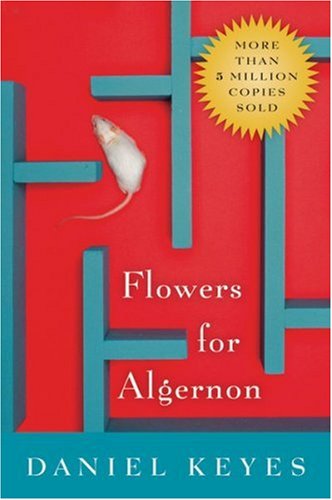All Nonfiction
- Bullying
- Books
- Academic
- Author Interviews
- Celebrity interviews
- College Articles
- College Essays
- Educator of the Year
- Heroes
- Interviews
- Memoir
- Personal Experience
- Sports
- Travel & Culture
All Opinions
- Bullying
- Current Events / Politics
- Discrimination
- Drugs / Alcohol / Smoking
- Entertainment / Celebrities
- Environment
- Love / Relationships
- Movies / Music / TV
- Pop Culture / Trends
- School / College
- Social Issues / Civics
- Spirituality / Religion
- Sports / Hobbies
All Hot Topics
- Bullying
- Community Service
- Environment
- Health
- Letters to the Editor
- Pride & Prejudice
- What Matters
- Back
Summer Guide
- Program Links
- Program Reviews
- Back
College Guide
- College Links
- College Reviews
- College Essays
- College Articles
- Back
Flowers for Algernon by Daniel Keyes
Flowers for Algernon by Daniel Keyes is a very intriguing book, starting with the idea to make a man with a very low IQ of 70, and raising it to about 180. Every time I started reading, I had trouble putting it down. The story line is a good one, and the characters are all very interesting, but I did find that overall the story to be incredibly unrealistic. Not just the idea of making someone smarter, because I’m sure that one day science will be able to make mentally disabled people more intelligent, but the idea that they can make it happen within a couple of months, as well as the idea that Charlie became a super genius. Also that he fell in love, as soon as his emotions caught up to him.
I can understand why the book got banned, because the author gets very into depth on Charlie’s emotions towards women. He does a very good job on how Charlie feels, but I really didn’t like how Charlie went from being a very sweet boy, to a bit of a know-it all dork. Although I think the story was well written, and Daniel Keyes did a fantastic job of making you feel like you know the characters, I think the author should have made Charlie a more loveable character. After Charlie got the surgery, he seemed a bit too self-centered, and had a high temper. He seemed to snap at people all the time, not just towards the end of the story, and he seemed to wallow in self pity too much. The way he takes offence very easy, makes Charlie a hard to love character, that made the story a little harder to like.
The other thing I didn’t like was the idea that Charlie never had women far from mind. He was very willing, even at the peak of his intelligence, to sleep around with different women. Charlie seemed to have no respect for others, only for himself. I think women played too big a factor in the story, that’s about his intelligence, not his love life.
I also found that when Charlie saw himself following himself around, to be very confusing, and unrealistic. The book made it sound like there were two different people, the disabled Charlie, and the intelligent Charlie. I found that part of the book confusing and unnecessary. It seemed to have no meaning to the overall book.
The last, and final thing I disliked about the story, was that the storyline seemed to climb uphill a little, and then for 3/4 of the book, it went downhill. Charlie became smart, but right after that, bad things seemed to happen. The person he loved wouldn’t go out with him, he was having awful dreams about his mother, and then the issues with Algernon. I don’t want to give anything away, but I think the story is too depressing. Of course, I don’t mind that the book didn’t have a happily ever after, because it’s refreshing to read a story that doesn’t end with the characters riding off into the sunset, but in Flowers for Algernon, it seemed like one thing after another. The book had too many awful things, to balance out the good things. The middle was sad, and it just got worse until the conclusion. It was like one big downhill spiral.
I really appreciate some aspects of the book, and found that it was hard to put down. The overall storyline was very good, and the plot was exciting. I found that once I would start reading I would get caught up in the story, and need to see what happened next. Although the book was pretty depressing and went downhill from the beginning, I think that was one of the reasons it was so exciting. I kept waiting for it to get better. The author wrote it well, and did a good job with the characters. It really felt like you knew the characters, and although I didn’t necessarily like them, they seemed real, like you could go to New York and find them walking along the road.
I did enjoy the book, and I found it very interesting to read, but I’m not sure I would recommend it to others. The unrealistic part of it, Charlie’s personality changes, and how depressing it was, all in a way destroy the story. Although the book was very well written, and had spectacular word selection, there are a number of things I wish the author had done differently.
Similar Articles
JOIN THE DISCUSSION
This article has 0 comments.

